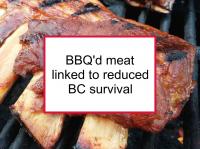Consumption of well-done or fried meat and fish has been linked to increased BC risk. The heightened risk appears to be a result of polycyclic aromatic hydrocarbons (PAHs) and heterocyclic amines (HCAs) produced during cooking. Now a new study has reported that grilled, barbecued and/or smoked meat is associated with reduced survival.
Most consumers prefer their meat to be seared (at least at the beginning of the cooking process) or otherwise prepared so that the juices are sealed in. With some exceptions, boiled or steamed meat that has not first been seared can be unappealing. However, searing, charring and deep frying meat or fish creates PAHs and HCAs.
Latest research links grilled/barbecued/smoked meat to mortality
The study referenced at the beginning of this news story was designed to investigate the associations between grilled, barbecued and smoked meat consumption and survival after a diagnosis of breast cancer. Grilled, barbecued, and smoked meats are a dietary source of polycyclic aromatic hydrocarbons, which appear to be breast carcinogens, increasing breast cancer risk. The study included 1,508 women diagnosed with first primary invasive or in situ breast cancer between 1996 and 1997 (baseline). To conduct the study, the authors interviewed the women at baseline and at approximately the five-year mark to determine grilled, barbecued and smoked meat intake. The baseline interviews generated data concerning prediagnosis intake. High intake was defined as above the median intake; low intake was below the median. Study participants were followed for a median of 17.6 years.
A total of 597 deaths occurred during follow-up, of which 237 were breast cancer-specific. The authors analyzed every possible combination of high and low intake, taking account changes in postdiagnosis intake. High prediagnosis total grilled/barbecued and smoked meat intake was found to be associated with a 23% increased overall risk of death (all-cause mortality). Other associations were also found but just missed the threshold for statistical significance. These include the following: (1) high prediagnosis smoked beef/lamb/pork intake was linked to a 17% increase in all-cause mortality and a 23% increase in breast cancer-specific mortality; and (2) among women who had high grilled/barbecued and smoked meat intake both before diagnosis and five years later, all-cause mortality risk was even higher (31%). In addition, breast cancer-specific mortality was found to be lowered among women with any pre- and postdiagnosis intake of smoked poultry and/or fish. The authors conclude that high consumption of grilled, barbecued and/or smoked meat may increase mortality after breast cancer.
